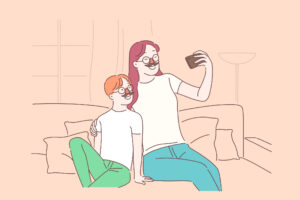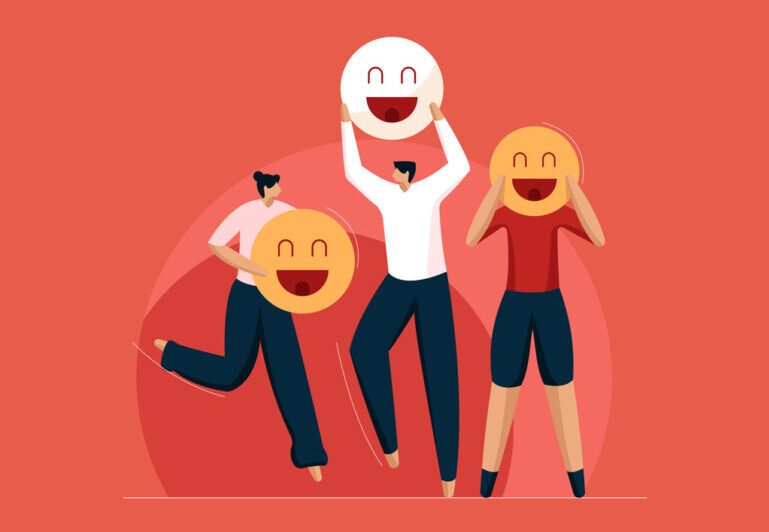In the world of modern technology, the rise of Internet gaming disorder (IGD), excessive social media use, and excessive mobile phone use has become a real head-scratcher for families everywhere. As a marriage and family therapist with a knack for humor and a background in researching IGD, MMORPG, and suicide, I’ve had my fair share of laughable moments in the therapy room.
Picture this: a family meeting straight out of a sitcom, complete with exasperated parents and an eye-roll-inducing teenager glued to their phone. The culprit? A classic case of doom scrolling—spending endless hours lost in the depths of social media feeds and online forums, only to emerge with a severe case of “FOMO” and a side of bad grades.
As the therapist, I couldn’t help but chuckle at the absurdity of it all. Here we were, trying to unravel the mysteries of social media misuse and excessive mobile phone use, while simultaneously dodging memes and cat videos flying across the room.

But amidst the laughter, there was a lesson to be learned. Excessive social media and mobile phone use may seem like frivolous topics for therapy, but they can have real consequences for individuals and families. From strained relationships to academic setbacks, the effects can be no laughing matter.
So, how did this family turn their doom-scrolling disaster into a comedy of errors? With a healthy dose of humor and a dash of parental support, of course! Instead of resorting to drastic measures like confiscating phones or implementing strict screen time limits, they opted for a more light-hearted approach.
Together, they set up a “Doom Scrolling Support Group” where family members could share their most ridiculous online finds and commiserate over their shared addiction to endless scrolling. They turned bad grades into a running joke, with the teenager earning extra credit for coming up with creative excuses for why their homework was late (“Sorry, I got lost in a Twitter thread about conspiracy theories”).
In the end, it wasn’t about banning technology or shaming each other for their online habits—it was about finding balance and maintaining a sense of humor in the face of modern-day distractions. As a marriage and family therapist, I couldn’t have been prouder to witness this family’s resilience and ability to laugh through the doom.
So, the next time you find yourself falling down the rabbit hole of Internet gaming disorder or excessive mobile phone and social media use, remember to embrace the absurdity, lean on your loved ones for support, and never underestimate the power of a good laugh.
In the end, it wasn’t about banning technology or shaming each other for their online habits—it was about finding balance and maintaining a sense of humor in the face of modern-day distractions.
Ezra Lockhart, PhD, MHlthSc(DD), LMHC, LAC, MFTC, MAC, CAS, CDCS, is an AAMFT Professional member holding the Clinical Fellow and Approved Supervisor designations. For over a decade (2004-2016), Lockhart maintained client practice and consultantships with multiple home healthcare agencies in the state of Alaska. Additionally, he studied with the Faculty of Health Sciences and Centre for Disability Research and Policy at University of Sydney in Australia completing a master’s degree in Developmental Disability. Lockhart is a board certified Chemical Dependency Counselor at the state and national levels. www.easydoesitcounseling.com
Other articles
Helping Clients Understand the Differences: The Importance of Psychotherapy in an Unregulated Coaching Landscape
In the modern age, there is indeed a focus on mental wellness. Individuals seek guidance and support to navigate the complexities of their lives. Amidst the myriad options available, from psychotherapy to coaching, it’s imperative to discern the nuances between these practices, particularly concerning regulatory oversight and the protection of clients’ well-being.
Ezra Lockhart, PhD
Micro Feminism: Small Acts of Feminism Can Confront Big Biases in Academia
Social media is flooded with videos of people—men, women, and those who are gender-fluid—explaining how they use micro feminism to challenge gender inequality in their personal lives. While you might not be familiar with the term “micro feminism,” chances are, you’ve observed or participated in the undoing of gender biases more often than you realize.
Danna Abraham, PhD
Expanding the Frame
This past spring, we had the pleasure of presenting together at the 2024 AAMFT Leadership Symposium in Phoenix. The title of our presentation was “Expanding the Frame: Leading the Charge on Relational, Multigenerational, and Systemic Awareness Among Mental Health Professionals.” We are both program directors of small, relatively nascent MFT programs in the Bronx, located roughly six miles apart.
Michelle A. Bell, PsyD & Sharon Marianetti-Leeper, PhD
